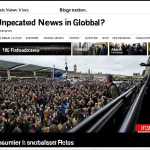Key Anticipated Challenges in the UK Media Landscape
The UK media faces significant challenges driven by rapid digital transformation and shifting consumption habits. The rise of new technologies, including streaming platforms and AI-driven content generation, demands constant adaptation. Traditional broadcasters and publishers must innovate to retain relevance in a landscape dominated by on-demand and mobile-first engagement.
Changing audience behaviour is another pressing issue. Consumers increasingly prefer personalized, interactive experiences, reducing engagement with conventional formats. Media companies must harness data insights to tailor content and maintain loyalty.
Additional reading : How is the UK tackling climate change challenges?
Economic pressures compound these challenges. Declining revenues from traditional advertising and print sales threaten financial stability, forcing companies to explore alternative income streams such as subscriptions, branded content, and partnerships. This economic fragility amplifies vulnerability to future market fluctuations.
Together, these factors create a complex environment, requiring media organisations to strategically embrace innovation while addressing the commercial constraints and evolving audience expectations that define future threats to UK media. Recognising these issues is critical for sustainable growth and maintaining the UK’s vibrant media industry.
Additional reading : What Are the Surprising Impacts of Recent UK News on Global Perceptions?
Regulatory and Policy Influences
The UK media regulations landscape is undergoing significant shifts, especially post-Brexit. Media policy changes are reshaping how content is governed, with a stronger focus on national standards and safeguarding digital communication. OFCOM plays a pivotal role in this transformation, acting as the primary regulatory body overseeing broadcasters, telecoms, and online platforms. Its responsibilities include enforcing compliance, licensing, and monitoring media content to ensure fairness and accuracy.
Government oversight extends beyond regulation, influencing policy directions that balance media freedom with accountability. This balance is critical in protecting freedom of speech while addressing harmful or illegal content. Recent policy adjustments reflect an effort to foster a responsible media environment without stifling journalistic independence.
Navigating these regulatory waters presents challenges for media companies facing future threats to UK media. Adapting to evolving rules requires strategic alignment and investment in compliance systems. This ensures ongoing access to UK audiences and protects media organisations from penalties. In summary, understanding and proactively engaging with media policy changes remains essential for sustainability in the UK media landscape.







